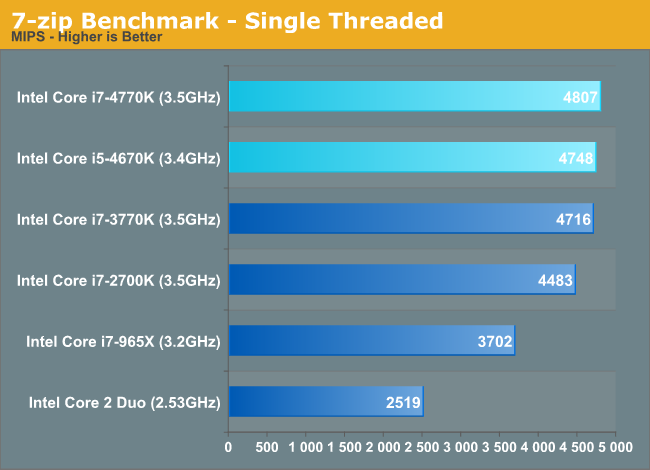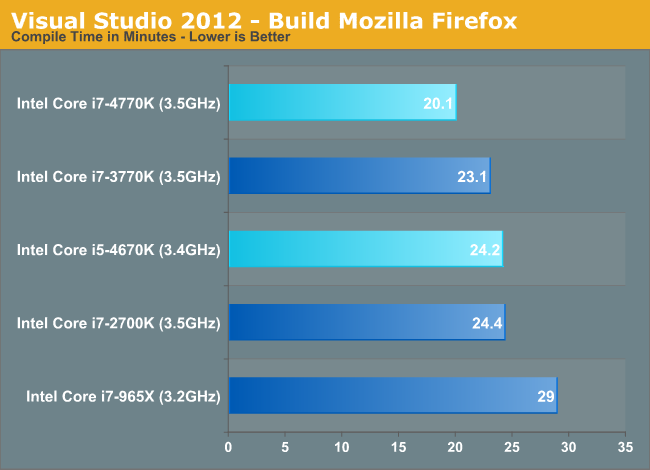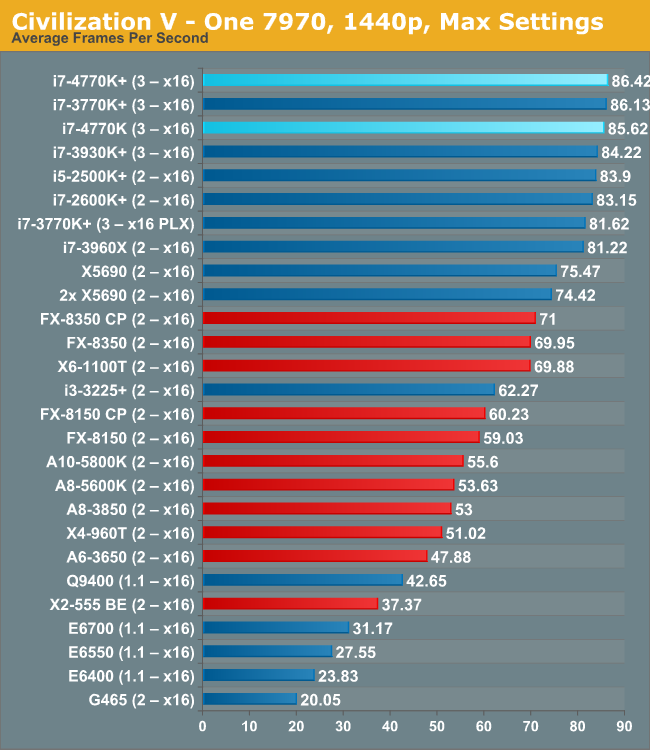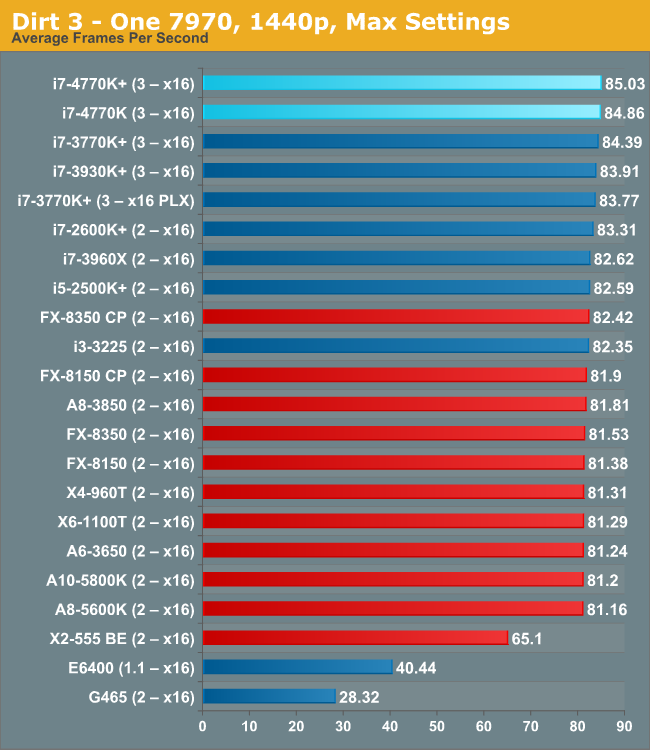The Haswell Review: Intel Core i7-4770K & i5-4670K Tested
by Anand Lal Shimpi on June 1, 2013 10:00 AM ESTCPU Performance: Five Generations of Intel CPUs Compared
For the purposes of our look at Haswell, we will be breaking up our review coverage into two parts. The rest of this article will focus on the CPU side of Haswell, while coverage of the GPU - including Iris Pro and Crystalwell - has been spun off into another artice: Intel Iris Pro 5200 Graphics Review: Core i7-4950HQ Tested.
The majority of the market doesn’t upgrade annually, so I went back a total of five generations to characterize Haswell’s CPU performance. Everything from a 2.53GHz Core 2 Duo through Nehalem, Sandy Bridge, Ivy Bridge and Haswell are represented here. With the exception of the Core 2 platform, everything else is running at or near the peak launch frequency for the chip.
In general, I saw performance gains over Ivy Bridge of 1 - 19%, with an average improvement of 8.3%. Some of the performance gains were actually quite impressive. The 7.8% increase in Kraken shows there’s still room for improvement in lightly threaded performance, while the double digit FP performance gains in POV-Ray and x264 HD really play to Haswell’s strengths.
Compared to Sandy Bridge, Haswell looks even more impressive. The Core i7-4770K outperforms the i7-2700K by 7 - 26%, with an average performance advantage of 17%. The gains over Sandy Bridge aren’t large enough to make upgrading from a Sandy Bridge i7 to a Haswell i5 worthwhile though, as you still give up a lot if you go from 8 to 4 threads on a quad-core part running heavily threaded workloads.
Compared to Nehalem the gains average almost 44%.











Quite possibly the most surprising was just how consistent (and large) the performance improvements were in our Visual Studio 2012 compile test. With a 15% increase in performance vs. Ivy Bridge at the same frequencies, what we’re looking at here is the perfect example of Haswell’s IPC increases manifesting in a real-world benchmark.
Gaming Performance
After spending far too much time on the Iris Pro test system, I didn’t have a ton of time left over to do a lot of gaming performance testing with Haswell. Luckily Ian had his gaming performance test data already in the engine, so I borrowed a couple of graphs.
As expected, Haswell is incrementally quicker in GPU bound gaming scenarios compared to Ivy Bridge - and most definitely at the top of the charts.












210 Comments
View All Comments
IUU - Thursday, June 6, 2013 - link
These are some very good processors. What is misplaced though is the graphics part. It is ok for mobile processors to have such a part, but for high energy consuming desktop processors, it is irrelevant and more of a burden. In the desktop world you expect a cpu with the highest possible processing power. It is 2013 and quad core is kind of old, come on intel don't be shy bring 8 and 10 core processors, you have the room to accommodate it. If I want graphics I 'll buy a monster graphics chip and will not be bothered by "optimal" power consumption.It is sad to see the energy efficiency and the computing efficiency improving only to accommodate a miserable graphics card. If you want us to buy graphics together with the cpu(an apu) make a chip with a tdp 300-400 because this is a mainstream energy budget for the desktop.
If it is impractical(which is probably the case) build your own discrete graphics.
Don't vandalize your cpus this way. If you want the mobile go for it, just don't contaminate your desktop products.
desky - Saturday, June 8, 2013 - link
same with me!I'm currently running an E8400@4,5GHz since 2008, and now seems a good time to upgrade.
I hope the haswell chip will overclock just as good. From what I've read that means that I may have to exchange the thermal paste under the IHS for some coolaboratory stuff...
Not decided on i5 or i7 yet though...
cmdrdredd - Monday, June 3, 2013 - link
You shouldn't have expected a reason to upgrade yet. Sheesh...we knew it would not be a real upgrade over an SB or IB CPU.peckiro - Monday, June 3, 2013 - link
I built a new from the case up Z77 rig with a 3570K processor running 24/7 @ 4.4GHz last fall. I seriously considered waiting for Haswell to hit the market before upgrading my machine (circa 2007). I'm glad I didn't wait any longer since, I have been running a damned fast machine for 8 months now. I think I may have felt perhaps a little bit underwhelmed if I had waited for Haswell. Just my 2 cents worth.cmdrdredd - Monday, June 3, 2013 - link
Yep...I built up my current 3570k system around the summer last yearyearkaiserreich - Saturday, June 1, 2013 - link
While you are right that load power consumption is higher, the system is not loaded all the time.Not for the common users any way. In that case, idle will serve as a better power performance indicator as opposed to load consumption.
tential - Saturday, June 1, 2013 - link
Pulling up this website and browsing my CPU utilization is under 20% and under 10-5% the majority of the time. Now I'm 5 years back on a Core2Duo. I'd imagine by now, if I was browsing this page on a Haswell, it'd be even lower considering processors are much faster as well. So mobile side I'm guessing that average battery life increased quite a bit. We'll see with the review. Using LOAD power consumption to judge mobile though is just plain ignorant.This is why some people need to stick to reading reviews, and wait for full reviews come out, rather than jumping to early conclusions and misinterpreting information.
t.s - Sunday, June 2, 2013 - link
So, what about people that want to gaming on laptop?takeship - Sunday, June 2, 2013 - link
Did you realize that these are all desktop chips? Let's not judge using desktop parts. But seriously, what percentage of users game with a mobile quad core & intel graphics?krumme - Saturday, June 1, 2013 - link
5-10% is on the positive side imho.http://www.guru3d.com/articles_pages/core_i7_4770k...
Sometimes it can even be slower :)
This processor is not intented for desktop. There is nothing wrong in that. But why all this bs covering it. Its a fine processor and a weird and shallow review.